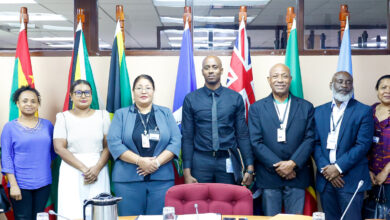(CARICOM Secretariat, Turkeyen, Greater Georgetown, Guyana) The importance of competitiveness and productivity improvements for Caribbean enterprises aspiring to take advantage of opportunities in regional and extra-regional markets was the main focus at a colloquium that brought together regional policy-makers and business leaders in Bridgetown, Barbados from March 20 to 21.
The Caribbean Export Development Agency (CEDA) mounted the Caribbean Exporters’ Colloquium, the culmination of a week-long suite of activities that unfolded during the inaugural Caribbean Export Week.
The theme informing the exchange of views in the colloquium was export-led growth, and the need for the Region to better and more strategically leverage the Economic Partnership Agreement (EPA), emerged as a common thread in panel discussions. The panels deliberated on: the ‘Time for Action’ Report tabled by the West Indian Commission in 1992,; the Region’s export performance; the practical experiences of regional enterprises in breaking through markets; the successes and shortcomings with respect to contemporary public-private sector partnership, in support of export development; and, lastly, taking stock of strategies and measures that can be pursued by regional enterprises in benchmarking competitiveness.
In respect of the latter point, the emerging consensus was that there is an urgent need for strong collaboration between regional public and private sectors. Participants were seized of the need for them to work more decisively, consistently and strategically in the pursuit of the best strategies and policies to assist enterprises in overcoming the obstacles to improving competitiveness. “A standing structure for regular dialogue between the regional private sector and governments is critically important,” noted The Hon. Anthony Hylton, Minister of Industry, Investment and Commerce of Jamaica.
For their part, private sector representatives stressed the need for greater participation of the private sector in policy making fora. There was also a call for an “effective advocacy body for the private sector to be put in place.”The role of agencies like CEDA, in respect of what was agreed should be a holistic approach to addressing regional competitiveness deficits, was recognized, as was the need for beneficiaries to do their part to contribute to mechanisms that would aid regional self-sufficiency in respect of business support programmes.
How the EPA is taken advantage of also came up for discussion, in light of one of its objectives: supporting the conditions for increasing investment, enhancing supply capacity, competitiveness and economic growth in the CARIFORUM region.
Constructive discussions were had on ways of building competitiveness during times of uncertainty in the global economy and in an environment of complex global value-chains. CEDA’s latest thinking on competitiveness was a focal point for this discussion.
“Effective and relevant platforms for export have to be created,” said Mr David Gomez, Manager, Trade and Export Development at the Agency. He underscored that the era of trade preferences was over, and as a result “mindsets” had to change. “The reality is that firms are operating in a competitive, modern global market. Building competitiveness should, therefore, be of primary concern. It’s not just about strengthening the productive base, but diversifying it such that products and services are globally competitive.”
He stressed that building brand value perception in the global market is of paramount importance. Moreover, products must deliver value for what the brand promises. “Franchising and licensing opportunities will emerge, as a result”, he said, arguing further that establishing a strong brand is critical with respect to global competitiveness but in also allowing for the capture of intellectual property that is resident in the brand.
The need for regional enterprises to look seriously at how they can position themselves in the global value chain also sparked a great deal of debate. A former top executive at a regional firm, Mr James Moss Solomon brought into relief the need to leverage export platforms that could build on branding. “We must move to taking regional brands to the world; ultimately the basic foundation of global trade is the corporation,” he said.
This point was supported by another panelist, Mr Nirad Tewarie, CEO of the Trinidad and Tobago Coalition of Services Industries. He sought, in this regard, to underscore how the Region can leverage the creative sector as a “beachhead to strengthen that feel good vibe around the Caribbean.” He noted that such a strategy can have tremendous benefit for the Region in the context of export-led growth.
There was also the recognition that in the context of export-led growth more had to be done “domestically” in regional economies, in terms of strengthening the production base. Ambassador Gail Mathurin, Director General of the Office of Trade Negotiations of the CARICOM Secretariat, brought this point out.
Mr Moss Solomon identified four stages of growth with respect to businesses, each of which require “different capital structures.” Against this backdrop, there was discussion of the need for appropriate levels of and institutional mechanisms for export financing to also provide impetus for export-led growth.
Participants were of the view that “now is a time when the Region is going to have to make some hard choices.” Minister Hylton enunciated this point against the backdrop of discussions on how regional enterprises are going to have to “pivot” themselves in the modern, competitive global economy.
In this regard, The Honourable Ryan Pinder, Minister of Financial Services of The Bahamas, spoke of “new ways of looking at regional integration, by linking production to logistics that match manufacturing expertise in different countries.” Minister Hylton in turn built on this point, speaking about “the Caribbean Sea as realizable asset.” He also spoke about the opportunity of Jamaica becoming a logistics centre, capitalizing on its proximity to Panama and efforts in train there to further develop the Panama Canal.
The Executive Director of CEDA, Ms Pamela Coke-Hamilton, advised participants that the Agency would work to compile the recommendations emanating from the Colloquium and share them, with a view to advancing on a regional export strategy.
The fifteen signatory Caribbean Forum of African, Caribbean and Pacific (CARIFORUM) States to the EPA are the independent CARICOM Member States and the Dominican Republic.





